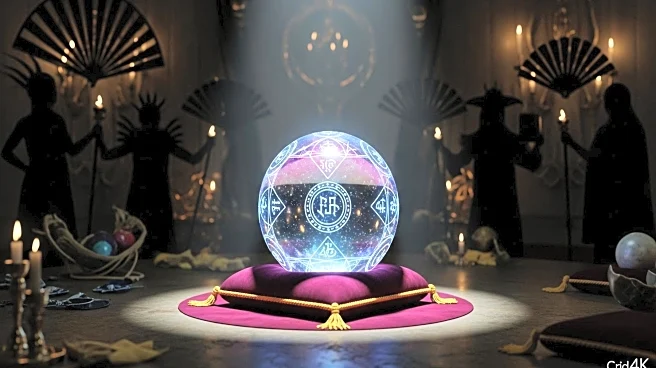What's Happening?
Fans of the Netflix musical 'KPop Demon Hunters' have started a new tradition at conventions worldwide, creating memorials for the character Jinu. Jinu, a lead vocalist in the fictional boy band Saja Boys, sacrifices himself in the film's climax, leaving a lasting impact on fans. These memorials typically feature a photo of Jinu surrounded by offerings such as stickers and notes, reflecting the character's significance and the emotional connection fans have with the story. The film's narrative, which includes themes of redemption and sacrifice, has resonated deeply with audiences, prompting this unique form of tribute.
Why It's Important?
The emergence of memorials for Jinu at conventions highlights the powerful influence of media on fan culture and community building. This phenomenon demonstrates how fictional narratives can inspire real-world actions and foster a sense of belonging among fans. The tradition not only honors the character but also strengthens the communal bonds within the fandom, providing a space for collective mourning and celebration. Additionally, it underscores the role of conventions as cultural hubs where fans can express their creativity and connect over shared interests.
What's Next?
As the tradition of memorials for Jinu continues to grow, it may influence future conventions and fan gatherings, potentially leading to more organized events centered around the film. The anticipation of a sequel, hinted at by the film's ending, could further fuel fan engagement and expand the narrative's impact. Convention organizers might also consider incorporating official tributes or panels dedicated to 'KPop Demon Hunters', enhancing the fan experience and fostering deeper connections within the community.
Beyond the Headlines
The memorials for Jinu reflect broader cultural trends in fandom, where fans actively participate in the creation and perpetuation of narratives beyond the original media. This participatory culture challenges traditional boundaries between creators and audiences, allowing fans to shape the legacy of the stories they love. It also raises questions about the nature of fandom and its role in preserving and transforming cultural narratives.










